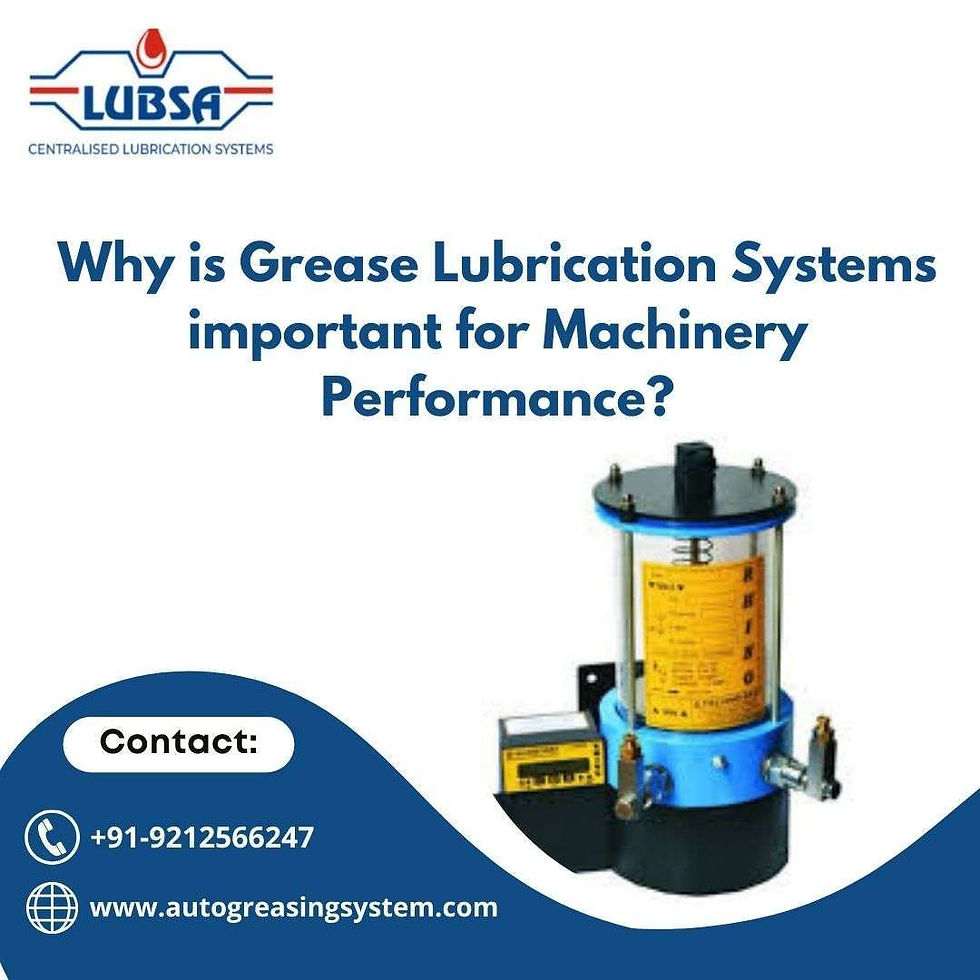Why Your Machinery Needs an Electro Pneumatic Grease Pump – Not Just a Lubrication Option, a Lifesaver!
- Lubsa Multilub Systems
- Sep 2, 2025
- 3 min read
In the current industrial landscape, consistent machinery operation is not a choice; it’s vital. Although lubrication systems like electro-pneumatic grease pumps are essential for seamless operations, a similarly crucial yet frequently neglected system is the hydraulic power pack and hydraulic cylinder. These elements not only convey energy but also serve as the fundamental force behind accuracy, dependability, and operational robustness in vital industries like manufacturing, construction, aerospace, and agriculture.
Let’s examine how hydraulic power units and cylinders serve as the unseen forces that maintain your equipment secure, efficient, and highly productive.
Components of a Hydraulic System
A hydraulic system combines force and motion via efficient and robust mechanisms that improve industrial automation. Here are the main elements:
Hydraulic Power Pack: A compact assembly that includes the electric motor, reservoir, and hydraulic pump, tasked with producing pressurized hydraulic fluid.
Hydraulic Cylinder: Transforms hydraulic energy into straight mechanical movement for elevating, pushing, or dragging heavy objects.
Pressure Relief Valve: Guarantees safe functioning by channeling surplus fluid to avert overpressure.
Directional Control Valves: Regulates the path of fluid movement to direct actuator actions.
Hydraulic Filters: Eliminates contaminants from hydraulic fluid to extend component lifespan and ensure system efficiency.
Coolers and Heat Exchangers: Keep oil temperature consistent for maximum system performance.
Sensors and Gauges: Track pressure measurements and system statuses to ensure safe functioning.
These combined elements deliver an exceptionally responsive, secure, and robust solution for challenging machinery requirements.
How Hydraulic Power Packs and Cylinders Enhance Performance
Hydraulic systems are recognized for their unparalleled power delivery and precise control, rendering them perfect for vital industrial uses.
Energy Efficiency: Hydraulic power units provide significant force in small dimensions, perfect for industrial environments with limited space. The hydraulic cylinder guarantees precise load management in both vertical and horizontal directions.
Steady Performance: In contrast to electrical systems that may overheat, or pneumatic systems constrained by air pressure, hydraulics provide reliable force and uniform performance, even when faced with intense workloads.
Minimal Upkeep: Designed for longevity, hydraulic systems need little maintenance. Through regular fluid inspections and correct setup, these systems can function for many years without significant issues.
Improved Safety: Elements such as pressure relief valves and consistent pressure regulation work to avoid accidents, especially in high-force situations like lifting and pressing.
Sustainable Choices: Modern hydraulic systems employ biodegradable fluids and low-leak parts, enhancing energy efficiency and adhering to environmental standards.
Hydraulic systems are not only practical; they are designed for the future and built to comply with changing industrial standards.
Applications and Advantages Across Industries
Hydraulic power units and cylinders are adaptable enough to be utilized in various sectors:
Construction: Power cranes, excavators, and bulldozers for lifting and excavation tasks.
Manufacturing: Operate presses, CNC machinery, and injection molding machines for accurate, consistent operations.
Farming: Utilize irrigation systems, harvesters, and tractors to enhance field productivity.
Mining: Facilitate powerful applications like drilling machines and loaders.
Aerospace: Utilized flight simulators, landing systems, and ground support equipment.
Marine: Manages steering, winches, and cargo operations.
Advantages include:
High Power Density: Providing strong force from a streamlined unit.
Exact Control: Seamless functioning with precise management of speed and pressure.
Longevity: Operates consistently in challenging and diverse conditions.
Energy Efficiency: Uses reduced energy relative to numerous mechanical or pneumatic options.
Modular Adaptability: Effortlessly customized to suit unique applications and spatial limitations.
Hydraulic systems act as the core of large equipment, facilitating efficient, secure, and effective performance.
Final Thought: The Real Driving Force Behind Your Equipment
Electro pneumatic grease pumps are crucial for lubrication, and when used alongside hydraulic systems—such as power packs and cylinders—they enhance machinery's reliability and precision significantly. These hydraulic parts provide more than mere movement—they provide control, allowing your machines to operate effectively, securely, and sustainably.
To minimize downtime, prolong the durability of your machinery, and maintain optimal control and safety, investing in a contemporary hydraulic system is essential, not merely a wise decision.
.jpg)



Comments